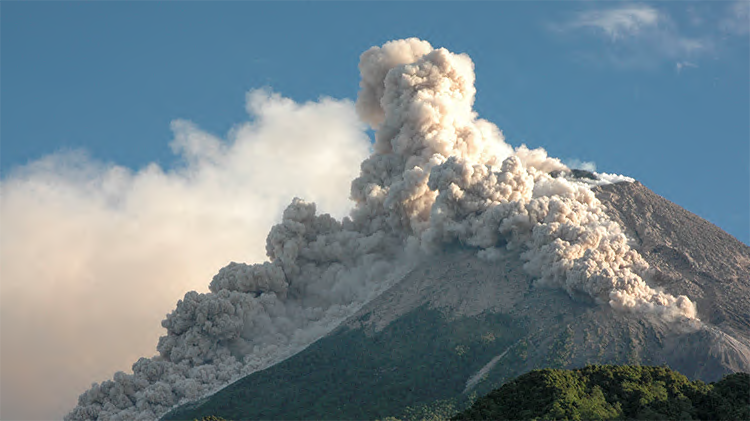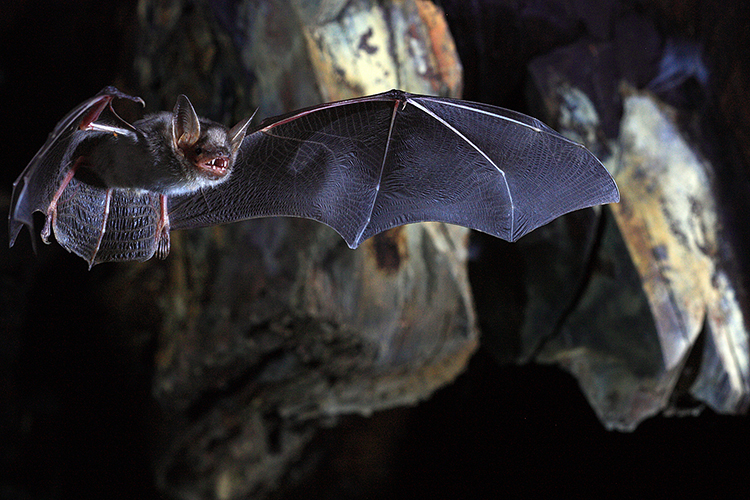Bats and volcanoes research awarded coveted ERC Synergy Grants
Posted 26 October, 2023

Two UCD researchers have each received €10 million in funding having been awarded coveted European Research Council Synergy Grants for their groundbreaking projects.
Addressing if it is possible to mitigate the risk of volcanic disasters and if bats could provide the solution to health and longevity, (opens in a new window)Assistant Professor Claire Harnett and (opens in a new window)Professor Emma Teeling each lead teams at University College Dublin that are among 37 across Europe chosen to share in a total of €395m in funding to support ambitious research challenging the the world’s most formidable problems.
Professor Teeling, UCD School of Biology and Environment Science, has pioneered global research into the development of bats as new models for healthy ageing and disease tolerance.
She will lead the Synergy project ‘BATPROTECT’, involving a team of 22 researchers including leading experts from Germany and Singapore, to enhance the understanding of the extraordinary lifespans of bats and their resistance to cancer and other deadly diseases including the coronavirus.
Assistant Professor Harnett, Ad Astra Fellow at UCD School of Earth Sciences, specialises in numerical modelling of volcanic environments.
She will work with fellow ‘ROTTnROCK’ project team members from Germany, Sweden and France to advance knowledge of volcanic processes that could ultimately help to predict and mitigate the hazards of unexpected eruptions and avert many tragedies worldwide.
Results of the 2023 ERC Synergy Grant competition are out!
— European Research Council (ERC) (@ERC_Research) (opens in a new window)October 26, 2023
37 research groups win a total of €395 million in (opens in a new window)#ERCSyG funding This will enable them to pool diverse expertise and resources to push the frontiers of knowledge.
Full story: (opens in a new window)https://t.co/qxp34JIn4u
(opens in a new window)#EUfunded (opens in a new window)pic.twitter.com/TavfybjnPQ
“We are immensely proud of Professor Teeling and Assistant Professor Harnett in this achievement,” said (opens in a new window)Professor Helen Roche, UCD Interim Vice-President for Research, Innovation and Impact.
“UCD is ranked number one in Ireland and 23rd among higher education institutions in Europe for Horizon Europe funding. These awards really exemplify the excellence of our outstanding researchers, who are building important international collaborations to address global challenges. I congratulate the winners and look forward to following their exciting work.”
Last year, (opens in a new window)Professor Padraig Dunne, from the UCD School of Physics, became the first researcher in Ireland to receive an ERC Synergy Grant for STEM.
A leading spectroscopist in the area of laser plasma emission and absorption spectroscopy, his project ‘HEAVYMETAL’ was awarded funding to probe how neutron star mergers create heavy elements.
ERC Synergy Grants, funded as part of Horizon Europe, aim to support ambitious projects requiring multiple disciplinary collaborations; empowering small groups of Principal Investigators to jointly address problems that can not be tackled by their teams working alone.
The 37 winning projects for 2023 involve 135 researchers across 114 universities and research centres in 19 countries across Europe and beyond.
“The selected projects are shining examples of audacious scientific thinking, and I eagerly await the outcomes of these collaborative endeavours,” said Professor Maria Leptin, ERC President. “I am also happy to see some European researchers teaming up with peers across several continents.
“Together, they are well-equipped to tackle the substantial scientific questions that our world is yearning to find answers to.”
Alongside their announced ERC Synergy Grants, the UCD projects awarded 2023 funding also received proposal development funding from Enterprise Ireland through its Horizon European Funding Supports.
About BATPROTECT
The challenges posed by ageing and infectious diseases in our societies come with significant medical, financial, and emotional burdens. While previous research has struggled to offer solutions to increase human health span and protect against the harmful effects of infections, bats - the only flying mammals - have naturally addressed both of these problems.

Myotis myotis, Greater mouse-eared bat, in flight Credit: Olivier Farcy
Even though bats serve as hosts for numerous dangerous viruses, they usually don't show symptoms of viral infections thanks to their unique immune system adaptations. Bats also have exceptional longevity and show little-to-no signs of any age related diseases.
The main objective of BATPROTECT is to make significant advancements in our understanding of the specific genetic and biochemical factors within bats that are responsible for their ability to live longer, healthier lives and resist diseases. Uncovering these molecular mechanisms could open up new possibilities for improving human health and disease outcomes.
The project brings together a team of world-leading experts in bat biology, genomics, immunology, and gerontology. Ultimately, this research will deepen our knowledge of how bats manage to stay healthy and resist diseases, potentially paving the way for future therapeutics.
Lead Principal Investigator (PI), Professor Teeling said: “We have just been given the most extraordinary opportunity to finally harness the amazing adaptations of bats and provide new ways to slow down human ageing and disease resistance. This ERC Synergy grant has enabled us to unite the fields of bat biology, virology, immunology, genomics and gerontology, across Europe and Asia, in order to achieve our goals.
“We are thrilled and excited to work together and uncover how we can live longer, healthier lives by learning from bats. I would like to thank the Irish Research Council and Science Foundation Ireland for initially funding this research, and Enterprise Ireland for their support.”
About ROTTnROCK
Volcanic eruptions threaten more than 10% of the world's population. Scientists monitor volcanoes to discover and understand possible risks and to provide early warnings of eruptions. But despite technological and scientific breakthroughs, certain volcanoes continue to surprise us with sudden and powerful eruptions or catastrophic collapses.
Previous research has shown that a process called hydrothermal alteration, which changes the chemical and physical characteristics of rocks inside a volcano, can turn them rotten and unstable. However, scientists still don't understand how these "soft" volcanoes tend to have unexpected outbursts.
This project intends to change our knowledge of hydrothermal alteration and its influence on volcanic risks by merging multiple scientific disciplines such as remote sensing, mineralogy, chemistry, rock mechanics, and modelling. This understanding could help us to predict and mitigate the hazards of unexpected volcanic explosions, eventually averting many tragedies worldwide.
PI for Ireland, Assistant Professor Harnett said: “We are really excited to get started on this project, which builds on our growing momentum to understand currently unforeseen volcanic hazards. One of the exciting aspects about the Synergy award is the capacity to build expert teams that will integrate information across four key disciplines (rock physics, geochemistry, remote sensing, and computational modelling) to provide a step-change in our knowledge around volcanic eruptions that are driven by processes other than magma ascent. I would like to thank the Ad Astra Fellow programme and Enterprise Ireland for their support.”
By: David Kearns, Digital Journalist / Media Officer, UCD University Relations (with materials from Emma Loughney, UCD Research and Innovation)
To contact the UCD News & Content Team, email: newsdesk@ucd.ie






